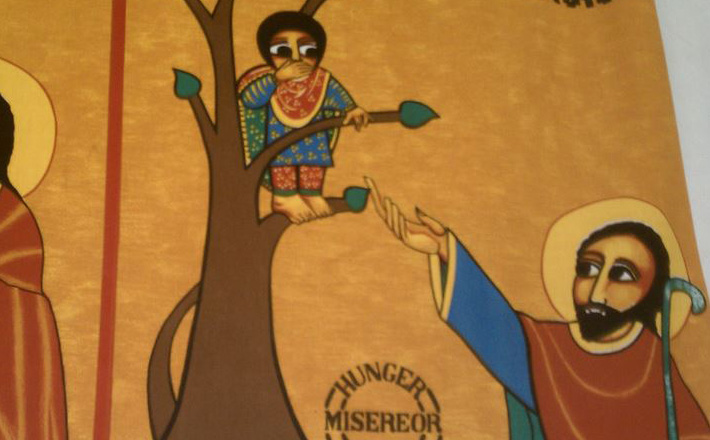Commentary on Luke 19:1-10
Following on last week’s parable, we find another story of a tax collector and a sinner and of God’s intention to seek and to save the lost.
Jesus is entering Jericho and will reach Jerusalem by the end of this chapter. As he is passing through, we are introduced to Zacchaeus (the winsome “wee little man” of the children’s song). He is a chief tax collector, and he is rich. Tax collectors, loathed as they were, are among the marginalized ones who cleave to Jesus in Luke. They are among the lost whom he comes to seek and save.
The rich, by contrast, are viewed with suspicion in this Gospel, as in all of them, because wealth is a problem and a danger. So the story, although it is familiar to us, actually begins on a note of ambiguity. Will this be another tax collector who leaves everything and follows, or will this be another rich man saddened by the claims that the kingdom makes on him and his wealth?
The next two verses make clear that this is probably the former because this rich man is trying to see Jesus. The word translated try is elsewhere, including verse 10 in this passage, translated seek or search or strive, and people who seek the right things in Luke tend to find them. In fact, as we hear in verse 10, people who seek Jesus tend to find that it was actually Jesus who was seeking them all along.
The good news about Zacchaeus might also be presaged by the use of the term short or little. On the one hand, this is simply a short person, and that is how he ends up in a sycamore tree. But this term, in the superlative, is translated least, as in 9:48, “Whoever welcomes this child in my name welcomes me, and whoever welcomes me welcomes the one who sent me; for the least among all of you is the greatest.” And so there may be a sense in which Zacchaeus by climbing that tree in the manner of a child and embracing his littleness, so to speak, becomes one of the least of these. It is precisely because he humbles himself in this way that he is in a position to welcome Jesus just two verses later.
Jesus finds Zacchaeus in his tree and invites himself home with him, and Zacchaeus welcomes him rejoicing.
This occasion is met with grumbling among those who observe that (“once again,” they might be saying) Jesus is hanging about with sinners. There is similar grumbling among the Pharisees and the scribes about Jesus’ association with sinners and tax collectors at 15:2, which leads directly into the three parables of the lost and found sheep, coin, and son. And here too a lost one is about to be claimed.
Zacchaeus resolves the issue of his wealth introduced in verse 2 by saying that he is giving half of his possessions to the poor and paying back those he has defrauded four times what he has taken. The use of the Greek present tense in Zacchaeus’ statements means that this commitment is ongoing, not something he will do only once, and it may mean that he has already been doing these things.
The importance of wealth and poverty in Luke is evident from early in the Gospel when, in her Magnificat, Mary speaks of the Lord sending the rich away empty and filling the poor with good things. The poor (not in spirit as in Matthew) are blessed in Luke’s beatitudes for theirs is the kingdom of God. The foolish rich man who builds bigger barns to contain his wealth dies with nothing to show for it, and his story is followed by the image of the ravens and the lilies and the instruction from Jesus (12:33-34): “Sell your possessions, and give alms. . . . For where your treasure is, there your heart will be also.”
In 16:19-31, after having said, in the presence of the Pharisees (identified in 16:14 as “lovers of money”), “You cannot serve God and wealth,” Jesus tells the parable of the rich man and Lazarus. The rich man, who ignores the desperately poor Lazarus at his gate, looks up from the torments of Hades after his death and sees Lazarus with Abraham. He begs for comfort, which does not come, and then asks that Lazarus be sent to his brothers to warn them. And Abraham finally replies, “If they do not listen to Moses and the prophets, neither will they be convinced even if someone rises from the dead.”
The story of Zacchaeus resonates with that story not only through the references to Zacchaeus’ wealth and his intention toward the poor, but also because of the particular way in which Jesus responds. First, he proclaims that salvation has come to that house, and we understand that the salvation is in the very person of Jesus, who has come to seek out and save the lost, like the shepherd and the woman with her broom and the welcoming father of chapter 15.
But he adds: “. . . because he too is a son of Abraham.” In other words, there is plenty of hope for the rich of the world as soon as they notice the Lazarus at the gate and do something serious about that. Even the most marginalized and despised of the rich, the tax collectors, have a place in the bosom of Abraham, in the community of the blessed, when they seek the right treasure.
Zacchaeus’ rejoicing expands into the rejoicing of the whole multitude of the disciples in 19:37 as they welcome their king who comes in the name of the Lord. The Queen’s jubilee was celebrated last year here in the UK, and when she would visit a place, people would go to great lengths to catch a glimpse. So Zacchaeus is doing just that, climbing a tree to catch a glimpse of the king, but the difference is that when Jesus finds him and us, he doesn’t then offer a welcoming, regal wave and retreat to a palace. As Jesus puts it, salvation comes to Zacchaeus’ house. Jesus follows us home.


November 3, 2013